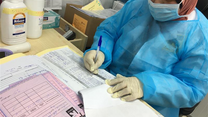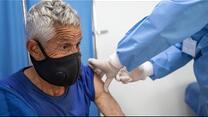✓ THE PROBLEM: Prior to the COVID-19 pandemic, the International Rescue Committee (IRC) clinics prioritized Syrian refugee and vulnerable Jordanian NCD patients at high-risk of developing severe disease (i.e., ≥50% had both hypertension and diabetes, 40% had serious comorbidities, and 12% were diabetics dependent on insulin). As Syrian refugees, the cohort was reliant on free medications and insulin and were generally dependent on humanitarian assistance. As the COVID-19 pandemic hit Jordan, IRC clinics were required to close, and the needs of refugees with NCDs became severe and remained unmet.
✓ WHAT WE DID: Primary care models for non-communicable disease (NCD) management which integrate community health workers have been effective in controlling disease in several low- and middle-income countries.1 The IRC rapidly-scaled a ‘remote’ version of a community volunteer (CHV) program for patients with hypertension and/or diabetes based on (1) delivery of medications to local pharmacies and (2) monthly telephone consultation by CHVs (including monitoring of complications, counselling, and COVID-19 preventative messaging and screening of symptoms).



